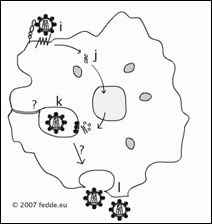
You know if our antibodies do not work alone in maintaining immunity (immune system) and resist the attack antigens (foreign objects) that come from outside. There are other cells called 'Macrophage' which assist in keeping our Immune system.

Macrophages are cells produced by the network contained in the blood as Monocytes. Macrophages derived from cells in the spinal cord of the Promonosit then divides into monocytes and circulate in the blood. Macrophages derived from the Greek word meaning "Big Eater". with the size of 21 micrometers in diameter.
Macrophages are large cells with phagocytosis ability, which means "cell eating" can be equated with pinositosis which means "cell drinking". Phagocytosis is the ability to absorb and destroy microorganisms (bacteria or foreign substances). Way macrophages to destroy (eat) bacteria or foreign matter is by forming the cytoplasm when bacteria or foreign objects attached to the cell surface of macrophages, and then it curved into the cytoplasm of the bacteria, or wrapped the foreign body, cytoplasm bulge will fuse together into one so bacteria or foreign objects get caught in the vacuole. Lysosomes that have the ability to break down the material that comes from within and from outside will be merged with the vacuole so that bacteria or foreign substances will be destroyed.
Macrophages have a function or a primary role for eating and digesting particles together with lysosomes is related to defense and repair functions, another function is to produce IL (Inter Leukin) governing duty-B cells and T cells from lymphocytes and mobilize the body's defense system Another, also macrophages sekretori cells that can produce tumor necrosis factor (TNF = tumor necrosis factor) that can kill tumor cells, also produced some important substances including enzymes (lysozyme, elastase).
Tues Macrophages have a free and fixed macrophages. Free macrophages are cells that are able to move freely, was found in interstitial tissue macrophages and histiosit form. While macrophages remained, unable to move freely as free macrophages, interstitial tissue was found in the spleen, lymph nodes, and in the liver.
But this has no effect on the HIV virus. According to the study of this virus can not neutralize the "Macrophage". In fact, Macrophage is a place for HIV to protect themselves from the other antibodies and antigens. Macrophages is one of the first cell in the infection by HIV. Macrophages also serve as spreaders of HIV to various cells and other tissues.




0 comments:
Post a Comment